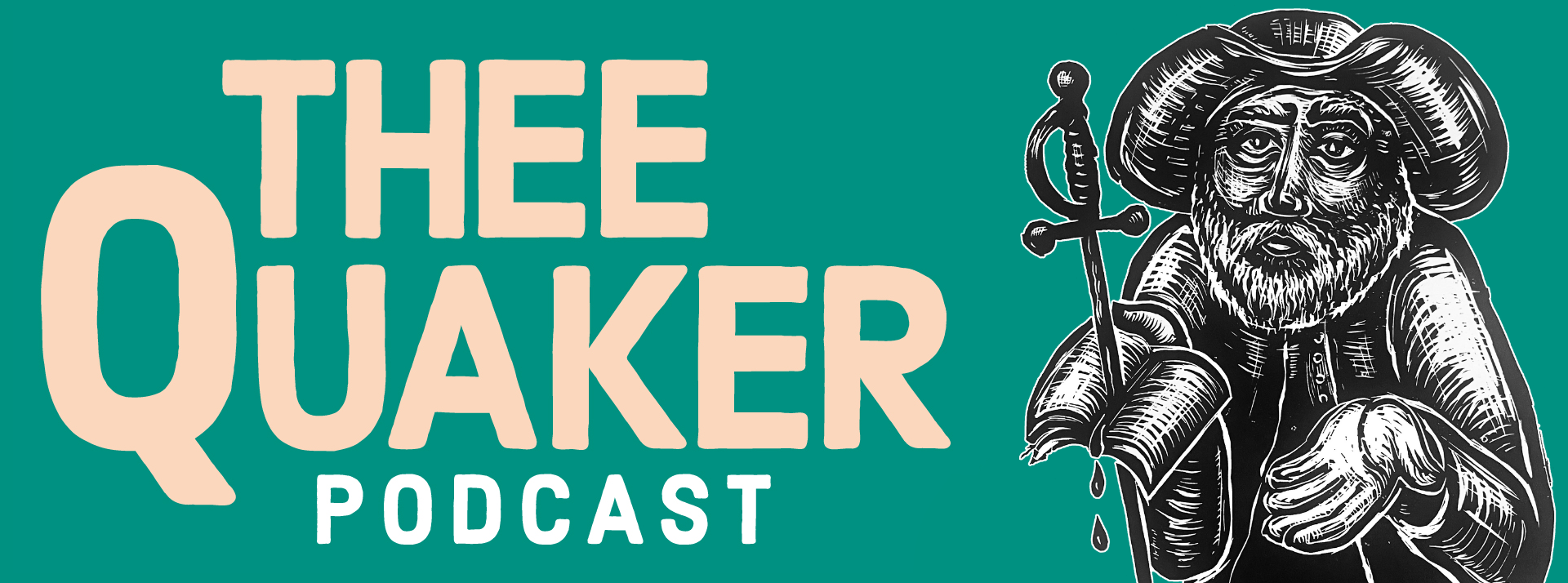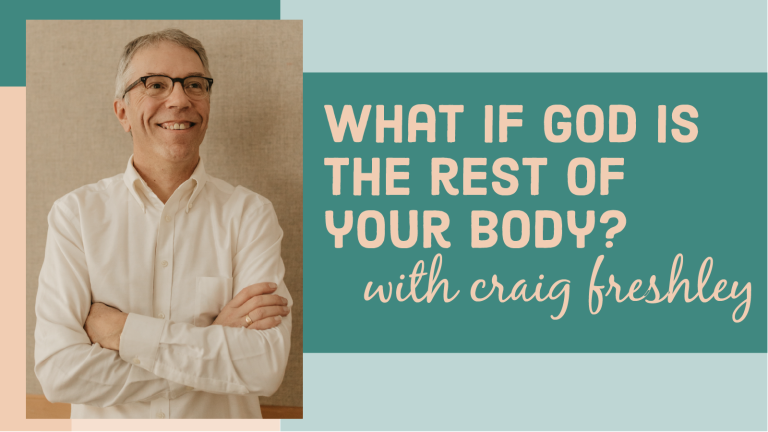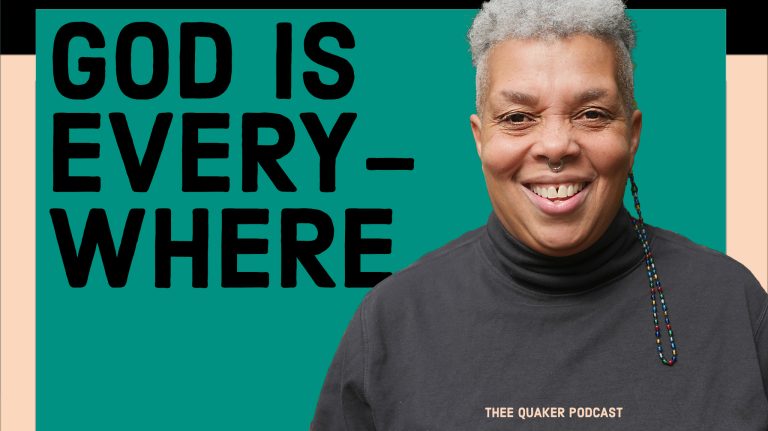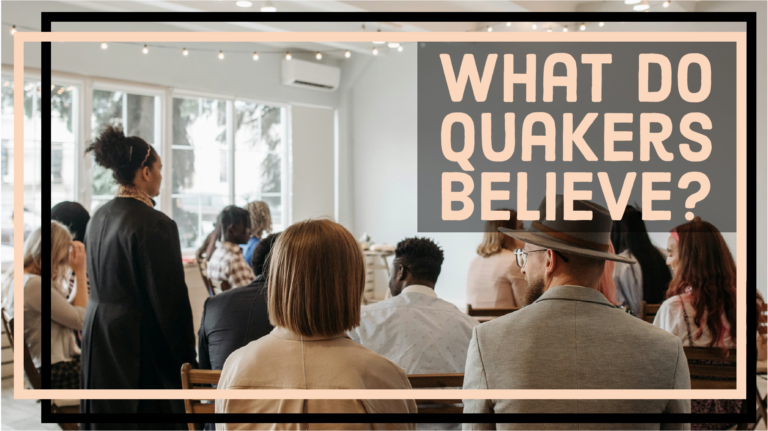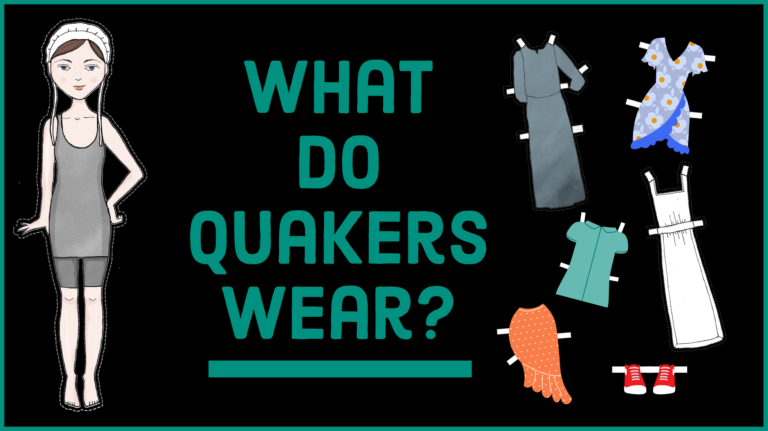Embracing God’s Gentle Love
It is easy to be hard on ourselves and hard on other people, but what if we practiced gentleness? And what if we believed that God’s posture toward us is gentle?
That’s the message that Quaker pastor Hannah Lutz brings us on today’s episode, and it’s one that she learned when she realized there was “chainmail” around her heart. Join us as we hear some wise words from Hannah.
Subscribe so you don’t miss an episode!
Leave a comment below to share your thoughts on Hannah’s message!
Download the transcript and discussion questions.
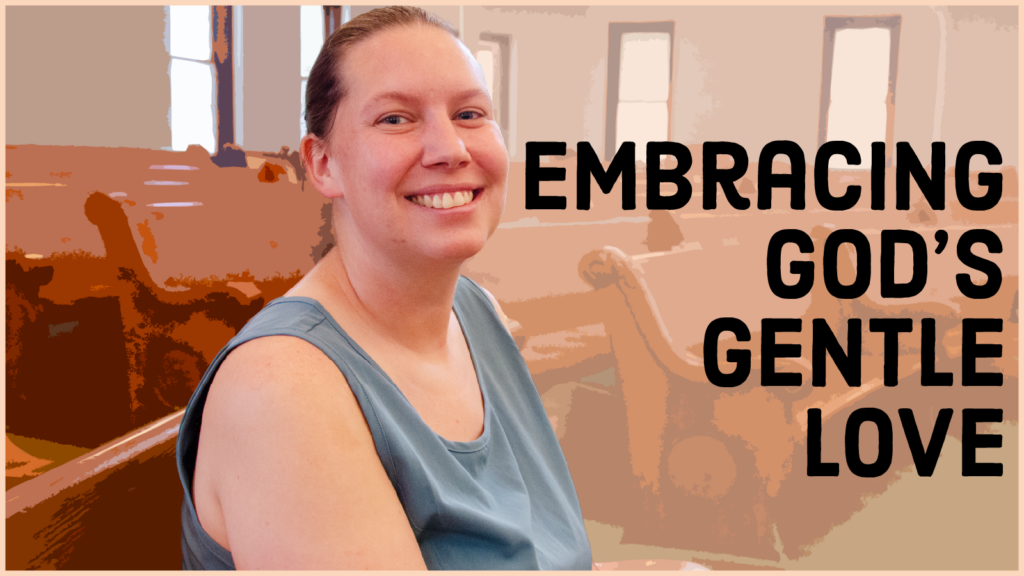
Discussion Questions:
- What does gentleness look like in your life? How do you embody it?
- Is there any “chainmail” around your heart that is preventing you from being gentle in an area of your life?
Hannah Lutz: It is God’s hope for all of us that we not become cynical. It is God’s hope for all of us that we never become desensitized to wonder. It is God’s hope for all of us that the pure and squishy parts of us stay intact. wholeness, peace, restoration. It’s what God wants for every single one of us.
Various: Thee Quaker Podcast: Story, spirit, sound.
Georgia: Hello, everyone, it’s Georgia here. And for today’s episode, we’re going inside of Wilmington Friends Meeting in Wilmington, Ohio, and we’re going to hear a message from their new pastor Hannah, let’s, this is one of our vocal ministry episodes. And as a reminder, they are a way for us to introduce you, our listeners to other meetings and to hear the messages that are on the hearts and minds of Friends across the country and occasionally across the world.
It’s always extra special when we at Thee Quaker can visit these meetings ourselves. And that’s what I did for this episode. During my recent trip to Ohio, I got to spend some time in Wilmington. It’s a small town with deep Quaker roots. And if you heard last week’s episode called Quaker road trip, then you already know a little bit about the history of the area. So I’m really excited to pair it with this vocal ministry episode where we get to hear from a present day Quaker Wilmington Friends Meeting is in Downtown Wilmington.
And from the minute I walked in, they were so welcoming. You know, it’s always weird to be the new person at a church. But I instantly felt very at home. They knew I was coming. And many people came up to me and introduce themselves. It was great to meet some people who are listeners of the show in person. And it’s also just a beautiful church with a balcony and an organ and stained glass windows. But that is actually not where we’re going to start today’s episode, because Hannah is the pastor of not one, but two meetings in Wilmington. And so I knew if I wanted to get the lay of the land before hearing her message that I needed to catch Hannah before her first meeting of the day. So without further ado, let’s go meet Hannah.
Hannah: My name is Hannah Lutz. I’ve lived in Ohio my whole life. I’ve been a part of Wilmington Yearly Meeting my whole life. I grew up in Jamestown, which is a small town like 30 minutes away from here. And now I live in another small town about 20 minutes away from here and then I work here in Wilmington.
Georgia: I’m talking to Hannah on the stoop of Ada Chapel a few minutes before she leads her first congregation in worship.
Hannah: I think it was about 2016. I was I was attending the meeting that I’m actually still a member of one of the ladies there came up to me one day after church and she was like, You should preach the sermon next week. And I looked at her and I was like, No, I’m not going to do that. And she was like, yes, you’re going to do that. And I was like, Okay, I guess I’m preaching a sermon. So I did it.
And then I kind of I was like, Oh, I think I actually kind of enjoyed that. And then I kind of just went through this time of discernment and wrestling and I was working in banking at that time. I didn’t really love banking. And just the more that I discerned I realized that I was being called ministry so i i started pursuing being recorded by Wilmington Yearly Meeting as a minister. And then in 2017, Ada Chapel where we’re at right now their longtime pastor need needed a reprieve. So I came here to just be here, like two Sundays a month. And then when she retired, I became the pastor here.
Georgia: Ada Chapel is a small programmed meeting nestled in a neighborhood of Wilmington. There are 10 to 15 people most Sundays and Hannah leads the congregation in song and in the message. I asked Hannah how she goes about preparing those messages.
Hannah: I’m more of a more of a writer so I do sit and I do write the whole message but I tried to let go of some of my my perfectionist tendencies and just try to, you know, be like, this isn’t this isn’t an essay. This isn’t a paper. This is something that I’m going to be you know, talking to people. Yeah, so I usually start Monday with a lot of prayer, reading the Scripture, trying to just think about what I might say.
And then throughout the week I there’s a group of pastors here in town that I meet with on Tuesday mornings and sometimes they’re preaching the same some same thing I’m preaching, sometimes they’re not, but just listening to them talk is sometimes helpful for me to just listening to what other people are thinking about. And then, as the week goes, I just work on on writing it out. And I try to have everything done by Friday, but sometimes it’s a late night, Saturday night trying to finish everything. I always feel after I’ve, after I’ve given a message or preached or whatever you want to say, I tend to feel kind of vulnerable. And I’ve thought about why that is. And I think it’s because there is so much of it.
That’s like, I’m trying to, even if even if I’m not necessarily just standing up there talking about myself in my own experiences, it’s like, my, my experiences and the things that make me me are just kind of woven in that any way. So I think I do frequently try to connect to connect to people and just try to be pretty down to earth.
Georgia: This Sunday that I visited Wilmington was actually the first one that Hannah would be pastoring two meetings in town, Ada Chapel and Wilmington Friends, which is a larger meeting about a mile from Ada. I asked Hannah how she was feeling about all that.
Hannah: Today is my first Sunday doing it. So I guess we’ll see. Like, honestly, I feel like a 12-year-old or like the first day of middle school who’s like, but Mom, what if they don’t like me? And what if I don’t make any friends? That’s what I feel like. I think there’s a part of me too, that feels a little bit. I don’t know. Like even though my husband always like every time I say this, he’s like, Hannah, like this is not true whatsoever. But, you know, like I’ve always I’ve lived in small towns my whole life. It’s like there’s a part of me that still kind of feels like an imposter in places like I’m just Hannah, the small town hillbilly like. So I don’t know, there’s a part of me that worries about that. I’m like, Well, what if I’m just my vibe, and my personality just doesn’t really fit. But I mean, I think I think it will be fine. I just need to get through my my first day jitters.
Georgia: After the break, we’re heading over to Wilmington Friends Meeting to hear Hannah’s first sermon as their pastor.
Jon Watts: Hello, dear listener, it’s Jon here. And I wanted to hop on and tell you about something exciting that we have started this year in 2024. By now you’ve probably gotten used to a short piece in this mid-episode break, telling the story of a listener or supporter and asking you to become a supporter of the podcast. I’ve heard from a surprising number of listeners that it’s actually one of their favorite segments on the show.
And that’s pretty cool, considering that it’s basically an ad. So that’s not going away. But we aren’t the only ones doing good work that needs support in the Quaker world, not by a longshot. In fact, you may know of an organization or a project that could use more visibility, and we want to help after just a season and a half our audience now average is around 4,000 listeners per month and that number is growing. We have found those listeners to be thoughtful and engaged folks. Of course, you should know since you’re one of them.
So here’s what I’m building up to. If you know of an organization or a project that could use more visibility and support and could maybe benefit from some media creation and storytelling expertise. We want to help. This space right here in the middle of the episode could be dedicated to telling the story of your project. And that could have a major impact. Just reach out to us at QuakerPodcast.com/contact and let us know about your idea. Okay, back to the show.
Georgia: Welcome back. Before Hannah speaks, I’m going to read the Bible passage that preceded her message. It’s from the book of Mark, chapter six, verses six through 13. And for context that he that it refers to is Jesus and the 12 are His disciples. And he went about among the villages teaching, and he called the 12 and began to send them out to buy to and gave them authority over the unclean spirits.
He charged Use them to take nothing for their journey except to staff, no bread, no bag, no money in their belts, but to wear sandals and not put on to tunics. And he said to them, whenever you enter a house, stay there until you depart from there. And if any place will not receive you, and they will not listen to you, when you leave, shake off the dust that is on your feet as a testimony against them. So they went out and proclaim that people should repent. And they cast out many demons and anointed with oil, many who were sick and healed them.
Hannah: Some of you probably already know this, because of just knowing me from working in the yearly meeting office. But for the past two springs, I have been an assistant coach for green view’s middle school track team. And while that was the plan again, this year, in February, I found myself unexpectedly promoted to the high school team as a head coach. And a lot of ways this was very exciting. I love track. And I’ve become extremely fond of all of the kids who I’ve had the opportunity to work with. The chance to get to coach some of my former middle schoolers, again, on a more competitive level felt like a best case scenario, that was almost too good to be true. I couldn’t have gotten a better head coaching deal if I had tried. But at the same time, I was a little bit nervous.
There aren’t a lot of female coaches, coaching male athletes at Greenview. And there’s a pretty big difference between a middle school boy and a high school boy, I was afraid that the ones who I had not previously coached wouldn’t respect me that they would write me off as some dumb lady who was telling them to run, and that the ones who I had previously coached would just kind of go along with it and not say anything. And a team that doesn’t respect their coach is not a very successful team. So I decided to go into this track season with a different attitude than I have in the past, I decided that I was going to be tough and hard and strong, and that in doing so I would avoid any possible problems with the boys and that we would have a good season.
It’s hard to walk all over a coach who was wearing armor, even if she is six inches shorter and 70 pounds lighter than most of the athletes, right? Well, unfortunately, this turned out to be wrong, horribly wrong. Kids do respond well to boundaries and to discipline. But there is certainly a time and a place to call kids to account and to hold them to higher standards. But that time in place is not all the time. I was dressed in chainmail and equipped with a sword ready to slay a dragon. While these children were just standing in front of me in their gym shorts being teenagers. It’s really ridiculous now that I think back about it. I wasn’t building relationships with the kids who I didn’t already have relationships with. I wasn’t having positive interactions with hardly any of them.
I was coming home from practice everyday frustrated, and a bunch of them were acting skittish to come in to talk to me about stuff. In many ways, my coaching was way more ineffective than it would have been had a few boys not been crazy about a female coach. I came into the situation with fire and smoke when all that was actually needed was a little bit of gentleness and vulnerability. Kids are people just like you and me. People who want to be loved and cared for and seen even 16 year old boys. And thankfully, since realizing this and changing my posture, things got better. And we actually had a really good season.
The lesson at the heart of this little story that I told you the importance of walking into life gently is what I think that Jesus was getting at in today’s text. Ordinarily, I’m not a fan of spiritualizing the words of Jesus when we aren’t sure what to do with a teaching, or maybe when we just don’t like a teaching. But here to spiritualize Jesus’s words only make sense. Jesus lived in a time and in a culture where hospitality was a big deal. It was a big deal to those who found themselves in need of it. And it was a big deal to those who offered it. There was perhaps no bigger social faux pa than to see a traveler in need of a meal and have a place to stay and to not open your home up to them. Depending on the circumstances, hospitality could be a matter of life or death. But hospitality wasn’t just a one sided deal for the benefit of the receiver.
It went both ways. helped the giver to being a good host was As a way to earn social capital and to become more involved in the community, hospitality provided the giver with a sense of purpose and with a sense of belonging. So when Jesus told his disciples to go out into the village and to proclaim the good news, but not to bring food or money or a change of clothes, Jesus was not necessarily demanding from his disciples and extreme act of faith. He wasn’t trying to teach them about simplicity. He wasn’t trying to get them to categorize different needs into rank them in terms of spiritual importance, nor was he instituting some sort of rule where it was okay for people who were doing ministry work to become completely dependent upon the people whom they were ministering to. In fact, it really wasn’t about the disciples themselves at all. Instead, the command was about the people in the villages with whom the disciples would be interacting. As much as the gospel is good news. It’s also a challenging message. There are bits of the gospel that are hard to understand or hard to put into practice or just straight up asking for a whole lot. The people in the villages were going to be having their lives changed and their limits stretched, and the disciples were going to be the catalysts.
They were going to be the authority figures. And while it is always important to treat people well, authority figures have to be doubly conscious of how they are interacting with others. They have to treat people well if they want to do their job. For the disciples, then for them to show up in someone’s house with extra food and extra clothes and to not really need their hosts hospitality would be a slap in the face. It would be an act of dehumanization, it would strip the host of their dignity and disallow the host the opportunity to serve and to love their neighbors. And turn this would pollute the disciples message. It would impact how the people in the villages responded to them, and ultimately to how they responded to Jesus. It was important for the disciples to come in humble and vulnerable for the same reason that it was me that it was important for me to change what I was doing with my track team. Our call is to love God and to love our neighbors.
It is our call to do this publicly, out loud. And nine times out of 10 power and control and self sufficiency. And posturing and anxiety don’t lead to that happening. There’s a reason why strength is not a fruit of the Spirit. But gentleness is. Gentleness is part of who we were created to be. And gentleness is what the world around us and all of the people in it, ourselves included, need.
Gentleness opens up possibilities that control and strength shut down. It makes room for the Holy Spirit. It allows for flexibility. It gives God the space to be God and it gives us the space to be us. It offers up the opportunity to listen to be still and to change one’s mind.
Gentleness reminds us of who we are and of who’s we are.
It lifts us up out of the muck that is trying to keep us down. It whispers to the lies that we believe that tell us that we are not beloved children of God.
Gentleness holds us tight and safe while Jesus goes about the hard work of loving us back to life.
Gentleness creates peace. This is true not because gentleness is a cop out or because gentleness might encourage people to keep the peace rather than making it. But because gentleness fosters belonging, gentleness makes chaos and striving and survival mechanisms and defense measures null and void.
We were built for community we were built for harmony and for love and for care and for living and working together. Gentleness melts off the armor and allows it to happen. Gentleness wakes us up and enables us to bear God’s image into the world.
Similarly, gentleness brings us closer to God God Not as gentle. That is maybe not how you have been taught to think about God but the fruits of the Spirit are descriptors of God. That’s why they’re called fruits. As we are transformed, we act more like God. So gentleness helps us to get to know our very gentle God. It brings our guard down. It allows us to draw close and trust and without fear. Gentleness opens us up to God’s goodness.
Gentleness reconciles. And it resets. Just like how Jesus chose the path of death and refused violence in the face of violence and change the world and doing so. Gentleness changes the world. It’s contagious. It soften heart softens hearts. It spurs us on toward forgiveness.
Gentleness is God’s desire for the world. It is God’s hope for all of us that we will put our weapons down. It is God’s hope for all of us that we will allow ourselves to really get to know one another. It is God’s hope for all of us that we will allow ourselves to really get to know Him. It is God’s hope for all of us that we not become cynical. It is God’s hope for all of us that we never become desensitized to wonder.
It is God’s hope for all of us that the pure and squishy parts of us stay intact. wholeness, peace, restoration. It’s what God wants for every single one of us. And it begins with vulnerability. It begins with faith. It begins with deep, deep trust and the courage to allow God to transform us.
It begins with imitating Jesus in our day to day lives. It begins with living our lives wholeheartedly. Friends, I’m not going to tell you to go out into travel with no food or no money. I am not going to tell you that you only need what you are wearing today. But the truth is, is that we all need the gentleness that Jesus has to give us. We all need to do as Paul suggested in his letter to the Colossians and clothe ourselves with gentleness. If we want a more loving world, and I’m pretty sure we do, then we need more gentleness. So I’m going to ask you the question. What does gentleness currently look like in your life? How do you embody it?
How might you need God to pull it up out of your heart? And to replace the chainmail that you currently have on? How do you need God to show you how to be gentle? How do you need to practice gentleness? How have you experienced gentleness from God or from others? strength and toughness and efficiency and power and all of those other things that I talked about earlier, our idols, their idols, and nothing more. Jesus lived a life of gentle vulnerability. Jesus commanded His disciples to live such lives.
The Holy Spirit moves us and shapes us and turns us into people who were gentleness directly onto our skin. May we continue to be transformed? Holy Spirit come, Jesus, equip, and God deliver. Make us into gentle people. Make our lives the sort of lives that are marked with the love of Jesus. Make God’s gentle love be first in our lives, and first out before us.
Georgia: After the service and after the coffee hour, I pulled Hannah aside to debrief with her about her first Sunday at Wilmington Friends. I really liked what you were saying about gentleness and how to cultivate that in your own life. Can you talk a little bit about how that message was resonating with you as you were preparing for it this week?
Hannah: I was definitely feeling a tension within myself with while kind of what I talked a little bit about in the mess served with like coaching this past season, I was definitely feeling some tension over that and about how, how I had been presenting myself and how I had been approaching leadership versus what I probably should have been doing all along. And like, the more I thought about that, I was like, oh, you know what it was like? It was gentleness. And I guess that just kind of stuck out to me is like the thing to pinpoint there. It’s but yeah, I guess it just kind of came from a little bit of self reflection and a little bit of maybe beating myself up. But yeah.
Georgia: So I really loved what you had to say about God’s gentleness, because I think a lot of people have a completely different perception of God. So would you say a little bit more about why that was an important aspect of God for you to bring up in your sermon?
Hannah: You know, that shift has been so important for me and my own just my spiritual journey. You know, even though I mean, I, I grew up, I grew up Quaker, but living in a small town, I was very much swimming kind of in like that evangelical bubble, like, all of my Friends went to, like, the evangelical churches, and I would go with them sometimes to like their youth groups and all of their various things.
And so I mean, that idea of God, even though I don’t like I can honestly say, I don’t remember anybody ever just like teaching me like this, God is heavy handed and all of that. Even though no one said it directly. That was very much the, that was very much what I got from it, you know, it was that God was kind of just like, this guy in the sky, who loved us, but who we also had to, like, behave for and we had to please and I kind of went through a time of like, figuring a lot of stuff out in my, in my 20s.
And that was really one of the more important things that came from it was that just this realization that like, you know, God, God really is gentle. And, you know, it was one of those things like it kind of came to me experientially, but then also as I started, like, reading scripture and stuff, especially like in the Old Testament, because that is a lot of times where people get that idea of God is like being angry and wrathful.
But as I was reading through this is like, you know, God is actually pretty, like gentle, and forgiving, and patient, even throughout the Old Testament. So that Yeah, so I just kind of came to this point of I was like, Well, that wasn’t that’s not really who, who God is. And so I guess all that is to say that, that that has become really important to me as a as a minister. I feel like I know that God is loving and God is gentle. And God is kind.
Georgia: So one question that we always like to ask is, how did it feel to give this message like in your body?
Hannah: Yeah, so this happens to me sometimes, sometimes there’s parts of a message that even though I, I sat and I wrote it, and I know what it’s going to say there are parts that will just like, hit me. Like, I’ll feel a sense of peace or sometimes something I’ll just kind of like, bring up like, last summer I was preaching and I don’t even remember what I said. But I I said something about like, I love being alive and I love getting to live here and like I felt like little tears come to my eyes. And I was like, where did that come from? So sometimes yeah, sometimes like little little emotions come up and like I don’t know, I guess maybe that’s the Holy Spirit like softening my heart a little bit. Yeah, ministering to me, even though I’m ministering to other peoples.
Georgia: Thank you so much, Hannah.
Hannah: Thank you.
Georgia: Thank you for listening. And thank you to Hannah Lutz for sharing this message with us. Thank you also to the Friends at Ada Chapel and Wilmington Friends Meeting who were so welcoming. Please check out our episode page for photos for both meetings, discussion questions and a transcript. That’s at QuakerPodcast.com This episode was reported, written, and edited by me, Georgia:. Jon Watts wrote and performed the music. Studio D mixed the episode. If you like what you hear, please consider becoming a podcast supporter. You can do that on a monthly or a yearly basis, head to QuakerPodcast.com and click on Support to learn more.
Recorded, written, and edited by Georgia Sparling. Co-hosted by Jon Watts.
Original music and sound design by Jon Watts (Listen to more of Jon’s music here.)
Mixed and mastered by Studio D.
Supported by listeners like you (thank you!!)
Referenced in this episode:
